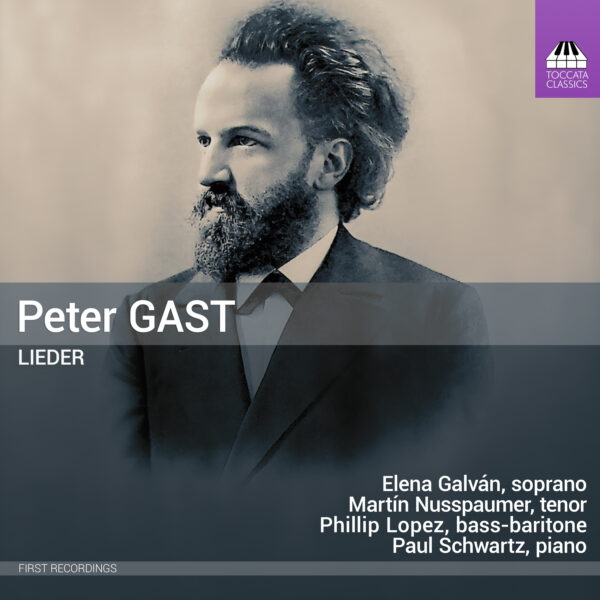Peter Gast: Lieder
The composer Peter Gast (1854–1918) – real name Heinrich Köselitz – is best remembered as a friend and posthumous editor of Friedrich Nietzsche rather than for his own music, which was kept under lock and key in communist East Germany for half a century; only recently has it begun to be performed and recorded. ‘Il faut méditerraniser la musique’, Nietzsche argued, and Gast’s Lieder, in a reaction against Wagnerian gloom, do just that, singing of love, life, springtime, drinking and youthful ardour; even the more wistful songs have a spring in their step.
Elena Galván, soprano
Martín Nusspaumer, tenor
Phillip Lopez, bass-baritone
Paul Schwartz, piano
Listen To This Recording:
Vier Lieder für eine hohe Singstimme mit Pianofortebegleitung, Op. 2 (publ. September 1895) (9:04)
- No. 1, Das bist du! (2:42)
- No. 2, Tristan musste ohne Wahl (2:48)
- No. 3, Lieblich wie ein Maienmorgen (1:45)
- No. 4, Abschied (1:49)
Vier Gesänge für Bass-Bariton mit Pianofortebegleitung, Op. 4 (publ. July 1896)
- No. 1, Zecher-Bibliothek (1:51)
- No. 2, Lachrimae Christi (4:27)
- No. 4, Wie bist du, meine Königin (3:13)
Sechs Lieder für Sopran mit Pianofortebegleitung, Op. 5 (publ. October 1896) (12:20)
- No. 1, Liebesflämmchen (2:16)
- No. 2, Ungeminnt (2:22)
- No. 3, Mutter und Kind (1:51)
- No. 4, Wiegenlied (3:14)
- No. 5, Magyarisch (1:21)
- No. 6, Trotzköpfchen (1:16)
Fünf Lieder für eine hohe Singstimme mit Pianofortebegleitung, Op. 6 (publ. June 1897)
- No. 1, Morgengruss (2:01)
- No. 2, Seliger Tod (1:40)
- No. 3, Lebenslust (2:26)
- No. 5, Maienzeit (1:46)
Sechs Lieder für Bass-Bariton mit Pianofortebegleitung, Op. 7 (publ. May 1897)
- No. 1, Erwartung (1:16)
- No. 4, Klage (1:53)
- No. 5, Heimkehr (2:25)
Sechs Lieder für Sopran mit Pianofortebegleitung, Op. 8 (publ. August 1900) (12:01)
- No. 1, Er hat mich grüssen lassen (1:29)
- No. 2, War ein holder Maid (2:26)
- No. 3, Ein Vöglein singt im Wald (1:48)
- No. 4, Meeresleuchten (2:13)
- No. 5, Der Traum (2:10)
- No. 6, Torenlied (1:55)
Fünf Lieder für Tenor mit Pianofortebegleitung, Op. 9 (publ. August 1900)
- No. 1, Meiner allerschönsten Lieder (2:32)
- No. 2, Wanderlied
- No. 3, Gondoliera (2:47)
- No. 5, Liebesschwur (2:25)


American Record Guide :
‘All [the singers] sing clearly with good enunciation. […]
Extensive notes by Robert B. Dundas supply a glimpse into the composer’s life and his relationship with Nietszche and give substantial summaries of each group of songs.’
—Robert A Moore, American Record Guide
Fanfare :
‘The Lieder on this recording certainly burst with joy. But it’s by no means a naïve, artless joy; each of the pieces on the program is well crafted and carefully constructed. Ardent, passionate vocal lines rising to sustained high notes are often undergirded by rich, virtuosic piano parts. […]
The program is performed by three very fine singers and a pianist who is every bit as attuned to the text as the singers are. […] Soprano Elena Galván is light- and bright-voiced, with easy high notes but full, warm low notes. She also has a knack for characterization. […] Bass-baritone Phillip Lopez resonates powerfully, even in the lowest reaches of his voice, but without heaviness or snarl. […]
There is not a bad composition among the 30 on this program.’
—Myron Silberstein, Fanfare
Fanfare :
‘This is a typical Toccata Classics release: hitherto obscure and even unheard music of value, accompanied by a fascinating story. […]
Having songs for three ranges makes for a nice variety, and the four young artists render the works with skill and ardor.’
—Peter Burwasser, Fanfare
Fanfare :
‘…admirably produced CD […].
This is a noble effort by Toccata to promote Gast as an antidote to Wagner. The booklet is a model of its kind with very detailed notes about the composer and the music, as well as texts and translations. Gast’s […] did compose very listenable Lieder. […] Do give this unheard composer a chance.’
—David Cutler, Fanfare
Fanfare :
‘Gast’s Lieder are well constructed and tuneful […].
Gast’s songs on these discs are uniformly of good quality and came as a very pleasant surprise […]. The performances here are excellent: each of the singers delivers good tone and graceful execution, and the piano accompaniment is thoughtful and beautiful. Likewise, the recorded sound is exemplary, consistent with Toccata’s usual standards. Those who like traditional 19th-century German Lieder in the mold of Schumann, Mendelssohn, and Brahms will find much to enjoy here. Recommended.’
—Keith R. Fisher, Fanfare